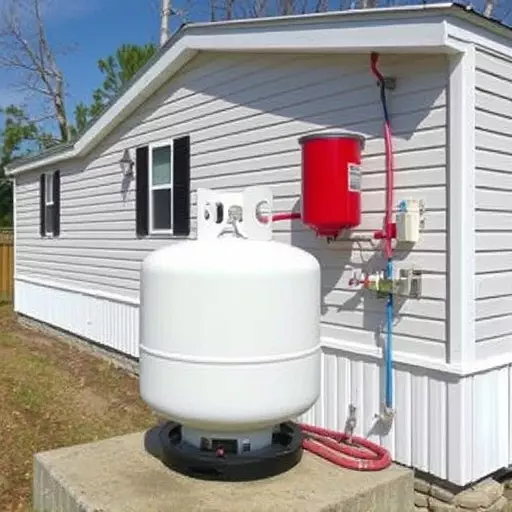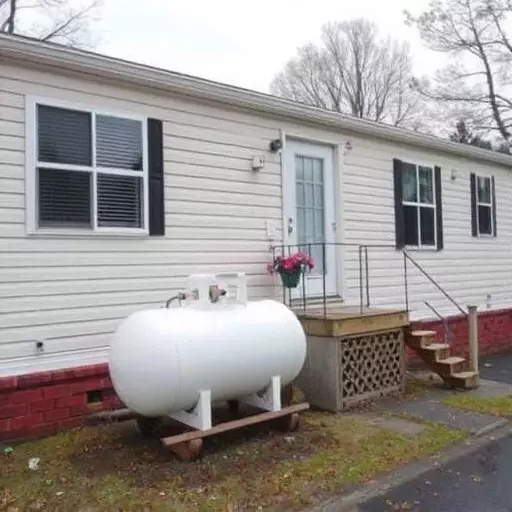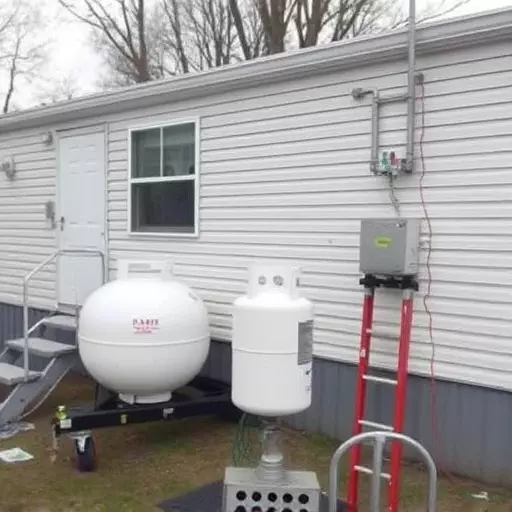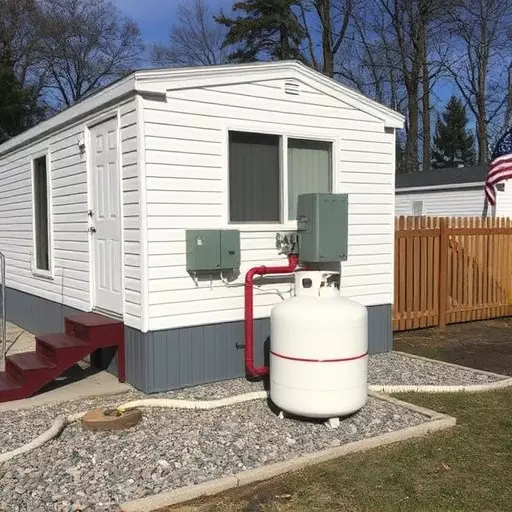Mobile home owners in Camden, New Jersey, require professional propane tank installation services for safe and efficient heating, cooking, and appliance power. Experts assess gas line compatibility, install tanks with secure connections, and adhere to local regulations for ventilation, piping, and valve systems. Choosing experienced professionals ensures a compliant, high-quality setup for mobile home propane systems.
Securely installing a propane tank in your mobile home is crucial for safe and efficient gas utilization. This comprehensive guide covers everything from understanding your mobile home’s propane system to choosing the right installation services in Camden, New Jersey. We’ll walk you through local regulations, step-by-step installation processes, and tips for selecting professional help, ensuring a reliable and compliant propane tank setup. Enhance your mobility with safe and efficient gas power!
- Understanding Mobile Home Propane Systems: An Overview
- The Importance of Secure Propane Tank Installation
- Steps for Installing a Propane Tank in a Mobile Home
- Local Regulations and Permits for Camden, New Jersey
- Choosing the Right Propane Tank Installation Services
Understanding Mobile Home Propane Systems: An Overview

Mobile homes, much like their permanent residential counterparts, rely on efficient and safe propane systems to power heating, cooking, and other essential appliances. Understanding the intricacies of a mobile home propane system is crucial for ensuring both functionality and safety. A typical mobile home propane system consists of several key components: a propane tank, a regulator, and various lines and valves that distribute gas throughout the home.
Proper installation of these elements is paramount. Professional installation services, such as those offered in Camden, New Jersey, play a vital role in securing safe and reliable propane systems for mobile homes. Experts in this field not only install but also maintain and repair these systems, ensuring they operate within safety standards and regulatory guidelines. This includes correctly sizing the propane tank to meet the specific needs of the mobile home, installing proper venting systems to prevent dangerous gas buildup, and ensuring all connections are secure and leak-free.
The Importance of Secure Propane Tank Installation

In the context of mobile homes, a secure propane tank installation is paramount for several reasons. Propane tanks are essential components of the heating, cooking, and energy systems in these homes, making their proper securing a safety measure that cannot be overlooked. An unstable or improperly installed tank poses significant risks, including potential gas leaks, fire hazards, and even structural damage to the mobile home itself.
For residents in Camden, New Jersey, seeking reliable and safe propane system installation services for their mobile homes, it’s crucial to turn to professionals who understand the unique challenges of these dwellings. Mobile home propane system installation experts employ specialized techniques and equipment tailored to ensure that tanks are securely mounted, reducing risks and promoting efficient, safe operation of these vital energy systems.
Steps for Installing a Propane Tank in a Mobile Home

Installing a propane tank in a mobile home is a process that requires careful planning and professional expertise to ensure safety and efficiency. The first step involves assessing your mobile home’s current gas line setup, which includes identifying the existing gas lines and their condition. It’s crucial to verify if your home uses 120- or 240-volt electrical systems for powering the propane tank and its associated components.
Once the assessment is complete, you can begin the installation process. This typically entails attaching a propane tank, usually a cylindrical storage unit, to a dedicated gas line that supplies fuel to your home’s appliances. Professional installers will ensure proper sealing and connection of these lines, adhering to local codes and regulations. They’ll also install a pressure regulator to control the flow of propane, ensuring safe and consistent gas supply throughout your mobile home.
Local Regulations and Permits for Camden, New Jersey

In Camden, New Jersey, residents looking to install a propane tank for their mobile homes must familiarize themselves with local regulations and permits. The city has specific guidelines that govern the installation, placement, and maintenance of propane systems in mobile residences to ensure safety and compliance. Before proceeding with any mobile home propane system installation camden new jersey or propane tank installation for mobile homes, it is crucial to obtain the necessary permits from the local building department. These permits are designed to safeguard against potential hazards associated with propane storage and usage, ensuring that installations meet all required safety standards.
Local regulations often dictate the type of propane tanks allowed, their size, placement, and distance from structures and other objects. They may also outline specific requirements for ventilation, piping, and valve systems. Camden’s building department can provide detailed information on these regulations and guide residents through the permit application process. Engaging with professional mobile home propane system installation services familiar with these local codes is highly recommended to ensure a safe and compliant setup of your mobile home’s propane tank.
Choosing the Right Propane Tank Installation Services

When it comes to installing a propane tank for your mobile home in Camden, New Jersey, selecting the right professionals is paramount. Look for companies specializing in mobile home propane system installation services with a proven track record and experience working on similar properties. Ensure they have the necessary permits and certifications to handle propane tank installations safely and securely.
A reputable service provider will assess your specific needs, including tank size, placement, and local regulations, to design a tailored solution. They should offer guidance on maintaining and inspecting the system to ensure longevity and safety. Choose a company that guarantees quality workmanship and uses high-quality components for peace of mind.


